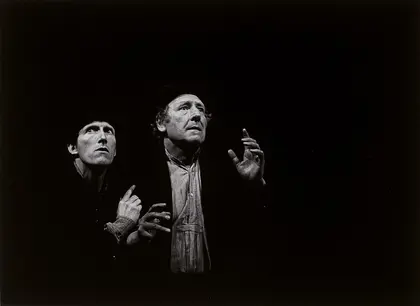Cultural life is burgeoning in some parts of Ukraine, while in others basic services remain out of reach.
Adam and Eve, Isaac Newton, and Steve Jobs have something in common: For all of them the apple has been very important.
JOIN US ON TELEGRAM
Follow our coverage of the war on the @Kyivpost_official.
In Transcarpathia – a region in western Ukraine bordering Hungary, Poland, Romania, and Slovakia – this idea is central to a sculpture created by Roman Murnik and recently installed in the historic Shernborn park not far away from Uzhhorod. Apple trees have been planted around it, and this “apple square” is just a recent example of the resurgence of art and culture in the region.
Transcarpathia is still relatively peaceful. Russian missiles don’t explode here thanks to Hungarian Prime Minister Viktor Orban’s increasingly steadfast friendship with Russian President Vladimir Putin. Hungary is blocking European financial assistance to Ukraine. It is also in favor of lifting economic sanctions imposed by the EU on Russia. What is more, Hungary recently announced its desire to develop economic relations with Iran.
The only advantage of these agreements for Ukraine is the relative calm in Transcarpathia.
At the beginning of the war, millions of refugees passed through Transcarpathia. More than 50 thousand internally displaced persons from all over Ukraine are still in the regional capital, Uzhhorod.
At first, these long-term displaced kept a low profile, but now they are making their presence felt in the region. Young newcomers to Transcarpathia have entered local colleges and universities and are active in the many volunteer projects that have sprung up.

EU Transfers €1.5 Bln Raised From Russian Assets for Ukraine
At the same time, the Theater Company of Re-settlers, known as UZHIK, has staged Shakespeare’s “King Lear” in Uzhhorod, and their production of Samuel Becket’s “Waiting for Godot” has just been premiered there.
Waiting for who knows what has acquired new meaning during the war.
The amateur troupe has adapted this latest production, but the central themes of uncertainty and expectation remain unchanged.
A schoolteacher from Irpin, Oleksiy Dashkovsky, portrays the role of Vladimir in this absurdist play. Estragon is played by Sophia Almaz, a refugee from Kryvyi Rih.
The UZHIK theatre group appears ready to grow and the Uzhhorod Philharmonic has given them its stage to use. In short, the theatrical life of Transcarpathia has been enriched since the start of the war and the Theater of Re-settlers is preparing for its first tour of western Ukraine and dreaming of a tour in Europe.
However, the resumption of basic services is the priority in the newly liberated city of Kherson.
Hopefully, UZHIK will soon be able to take a play to Kherson, but not “Waiting for Godot” – waiting is too raw a subject there.
Residents of the city occupied by Russian troops for eight months did not realize that the early spring announcement of a military campaign to liberate Kherson was disinformation designed to trick the Russians. Fortunately, Russia fell for it, allowing the Ukrainian army to liberate Kharkiv region quickly. Kherson, however, was left waiting for freedom.
Now, at last, the city is liberated, but theatre is way down the list of priorities. There is no electricity, no heating, no water in pipes, and almost no mobile communication: The retreating Russian military blew up all the mobile communication towers.
Nonetheless, about 80 thousand people still live in the city in these extremely difficult conditions. The government has offered to evacuate residents for the winter to the neighboring Mykolaiv region or to western Ukraine. But getting this message to the population is difficult due to the lack of internet and mobile communications.
On the brighter side, a supermarket and two banks have opened branches in the city, and one or two cafes have begun work. Local authorities promise to resume some electrical service within two to three weeks if there are no new attacks by Russian missiles on infrastructure facilities. That is a big if.
Explosions sound every day in Kherson. Not only are they Russian artillery firing from the other side of the Dnieper River, they are also the blasts from the forced demolition of administrative buildings which cannot be cleared of mines – including the security services building and the police department.
Work on checking and demining schools and kindergartens is coming to an end, however, they will not be used for their usual purpose this winter. So-called “spaces for the unbroken” are being set up in a dozen community hubs all over Kherson. They will have generators where visitors will be able to charge their phones and computers and connect to the internet via Starlink.
Doctors and social workers will be on duty to give help and advice. And, of course, you will be able to simply get warm, drink hot tea and have a snack.
Kherson is still waiting for good mobile communications, electricity, water, and heating. When these are restored, it will be possible to plan for the resumption of cultural life. That will be icing on the cake.
You can also highlight the text and press Ctrl + Enter






